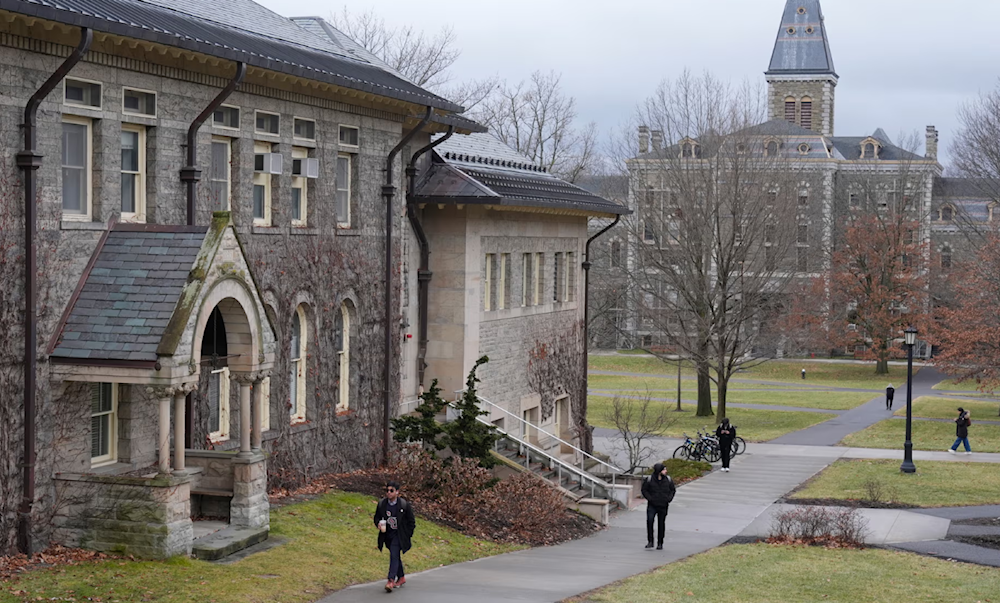White House cracks down on Cornell and Northwestern, freezes funds
The Trump administration freezes over $1.7 billion in funding for Cornell and Northwestern Universities, citing concerns over their handling of pro-Palestinian protests and "failure to protect Jewish students."
-
 People walk on campus, Cornell University in Ithaca, New York, February 2, 2024 (AP)
People walk on campus, Cornell University in Ithaca, New York, February 2, 2024 (AP)
Last month, the Trump administration sent warning letters to 60 US universities it said were facing “potential enforcement actions” for what it described as “failure to protect Jewish students on campus” amid widespread pro-Palestinian protests last year.
The president of Cornell University, Michael Kotlikoff, responded with a bold op-ed in the New York Times titled, "Universities Like the One I Run Aren’t Afraid to Let People Argue".
He said, “Universities, despite rapidly escalating political, legal and financial risks, cannot afford to cede the space of public discourse and the free exchange of ideas,” he wrote.
On Tuesday, the Trump administration froze over $1 billion in funding for Cornell University and $790 million for Northwestern University, which hosts a prominent journalism school, a US official said. The funding pause includes mostly grants and contracts with the federal departments of health, education, agriculture and defense.
Lee Bollinger, Columbia’s former president, in an interview with the Chronicle of Higher Education, described the situation as “an authoritarian takeover”.
Impact on critical research
In a statement Tuesday night, Cornell officials said that they were aware of “media reports” suggesting the federal government was freezing $1bn in federal grants, and “while we have not received information that would confirm this figure, earlier today Cornell received more than 75 stop work orders from the Department of Defense related to research that is profoundly significant to American national defense, cybersecurity, and health.”
Cornell officials said the affected grants “include research into new materials for jet engines, propulsion systems, large-scale information networks, robotics, superconductors, and space and satellite communications, as well as cancer research.”
Northwestern also said it was aware of media reports about the funding freeze but had not received any official notification from the government and that it has cooperated in the investigation.
“Federal funds that Northwestern receives drive innovative and life-saving research, like the recent development by Northwestern researchers of the world’s smallest pacemaker, and research fueling the fight against Alzheimer’s disease. This type of research is now in jeopardy,” a Northwestern spokesperson said.
Introducing the world's smallest pacemaker 💜 The device is so tiny, it can fit inside the tip of a syringe—and be non-invasively injected into the body.
— Northwestern (@NorthwesternU) April 2, 2025
This new pacemaker is particularly well-suited to the tiny, fragile hearts of newborn babies with congenital heart defects. pic.twitter.com/wZ3eRNDrsc
The recent funding freezes at Cornell and Northwestern coincide with similar investigations at Brown, Columbia, Harvard, Princeton, and the University of Pennsylvania. According to The New York Times, the Trump administration has already frozen at least $3.3 billion in federal funding for top universities over the past month, with additional billions still under review.
Cornell defends free speech amid funding freeze
In Cornell’s Tuesday statement, Kotlikoff defended the school as having “worked diligently to create an environment where all individuals and viewpoints are protected and respected,” and said they were “actively seeking information from federal officials to learn more about the basis for these decisions.”
“We cannot let our caution overtake our purpose,” Kotlikoff had written in the New York Times piece. “Our colleges and universities are cradles of democracy and bulwarks against autocracy.”
Trump has attempted to crack down on pro-Palestinian campus protests against "Israel’s" devastating war on Gaza, where "Israel" is currently being investigated by the International Court of Justice (ICJ) for genocidal war crimes. In 2024, the ICJ ordered "Israel" to halt "genocidal acts".
The US president has called the protesters "antisemitic", has labeled them as sympathetic to Hamas and foreign policy threats.
Protesters, including some Jewish groups, argue that the Trump administration incorrectly equates their criticism of "Israel’s" actions in Gaza and their advocacy for Palestinian rights with antisemitism and support for Hamas. Human rights advocates have also expressed concerns about the impact of the administration's crackdown on free speech and academic freedom.
In March, the Trump administration canceled $400m in funding for Columbia University, the center of last year’s pro-Palestinian campus protests.
Columbia faced backlash from academics and free speech organizations after agreeing to major changes demanded by the Trump administration. These included placing its Middle Eastern studies department under new administration, banning face masks on campus, granting campus security officers the authority to remove or arrest individuals, and increasing "intellectual diversity" by expanding its Institute for Israel and Jewish Studies.

 4 Min Read
4 Min Read










